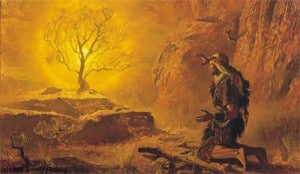We read in Breishit:
“And out of the ground HaShem G-d formed every beast of the field, and every fowl of the air; and brought them unto the man to see what he would call them; and whatsoever the man would call every living creature, that was to be the name thereof.( Genesis 2:19)”.
 The understanding of our sages of this verse has been that whatever Adam called the animal that was to be its spiritual essence as well. In a similar vein, the Holy Ari teaches that the name the parents choose for their baby is actually a ‘small prophecy’.The parents think they read or heard something that moved them to name their child in a certain way. Yet in fact it was prophetic inspiration that moved the parents to give the child the exact name that is destined for that child. That name then defines the child’s potential, direction or his or her challenge.
The understanding of our sages of this verse has been that whatever Adam called the animal that was to be its spiritual essence as well. In a similar vein, the Holy Ari teaches that the name the parents choose for their baby is actually a ‘small prophecy’.The parents think they read or heard something that moved them to name their child in a certain way. Yet in fact it was prophetic inspiration that moved the parents to give the child the exact name that is destined for that child. That name then defines the child’s potential, direction or his or her challenge.
That is true of almost every name we read in the Torah as well. Yet here are over seventy names for G-d in the Biblical text. In the case of the Infinite G-d, though, each name does not represent an aspect of His character, as that is beyond the comprehension of mortal man. The names of G-d actually represent the character of His relationship with His creation. Each of the differing names, then, representing differing aspects of G-d’s relationship with us.
And Moshe said unto G-d: ‘Behold, when I come unto the children of Israel, and shall say unto them: The G-d of your fathers hath sent me unto you; and they shall say to me: What is His name? What shall I say unto them?’14 And G-d said unto Moses:” Ehyeh asher Ehyeh” ‘; and He said: ‘Thus shalt thou say unto the children of Israel :Ehyeh hath sent me unto you.’ ( EXODUS 13:13 -14)
When Moshe asks G-d “and they shall say to me: What is His name?”, he is actually asking how are these people meant to relate to you.
Most English translations translate the words Eh-yeh asher Eh-yeh in the following way; I Am That I Am and that translation is generally incorrect. In Hebrew the word Hayah means “existed” or “was” but the word “Ehy-eh” is the first person singular present/future form. Eh-yeh asher Eh-yeh therefore really means “I Shall Be What I Shall Be”.
This is similar to the translation we see in the book of Zechariah ( 8:8 ):
“And I will bring them, and they shall dwell in the midst of Jerusalem; and they shall be My people, and I shall be( Ehy-eh) their G-d, in truth and in righteousness.
The impact of such a variance in understanding is powerful and deeply significant. The statement “ I Am That I Am” bespeaks an Eternal G-d that has always been and always will be. That is a true statement but in fact may not be the concept G-d was trying to transmit at this juncture in history . There is no point in transmitting to the Israelites suffering under the burden of slavery that the G-d that was, is the G-d that always is. People collapsing under the yoke of hatred and oppression do not have the ability to look up to the heavens, let alone see the Infinite and powerful G-d for what he is.
G-d answers that “I Shall Be What I Shall Be.”
Rabbi Yehuda HaLevy, author of the theological text ,the Kuzari, explains that this use of the future tense describes G-d not as much as the G-d of being but rather as the G-d of becoming. The Jewish people are beginning an endless journey of discovery with their G-d. All the events that they will experience and endure will be experienced as both a challenge and/or a lesson in developing deeper insight into their relationship with Him as a people.
We are living in a time when destiny and history are meeting each other in a quickened pace.
In order to be ready for the changes that are already in the midst of formation and the fulfillment that is already in the midst of blossoming we need to be prepared . We need to be able to discover the guiding hand of He who is called Eh-yeh. Those living in the past will not see it clearly. Those who only live in the present won’t know how to recognize it. Yet those that gain insight from “what was” and become involved in the miracles of “what is” but never lose sight of “what is yet to be” will merit see it with their natural eyes:
“And I will bring them, and they shall dwell in the midst of Jerusalem; and they shall be My people, and I shall be (Ehyeh) their God, in truth and in righteousness”.
Amen, may it occur speedily.
